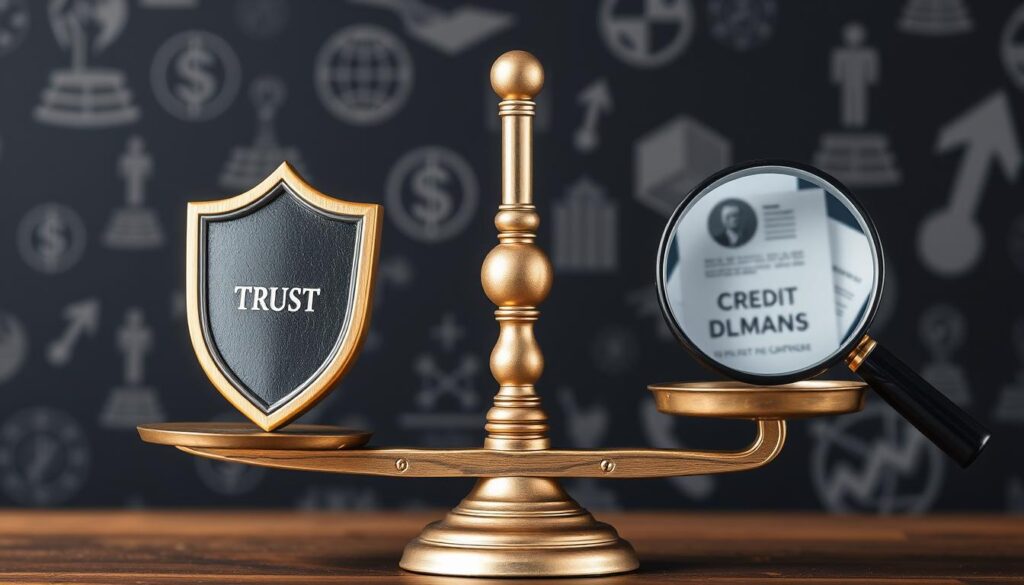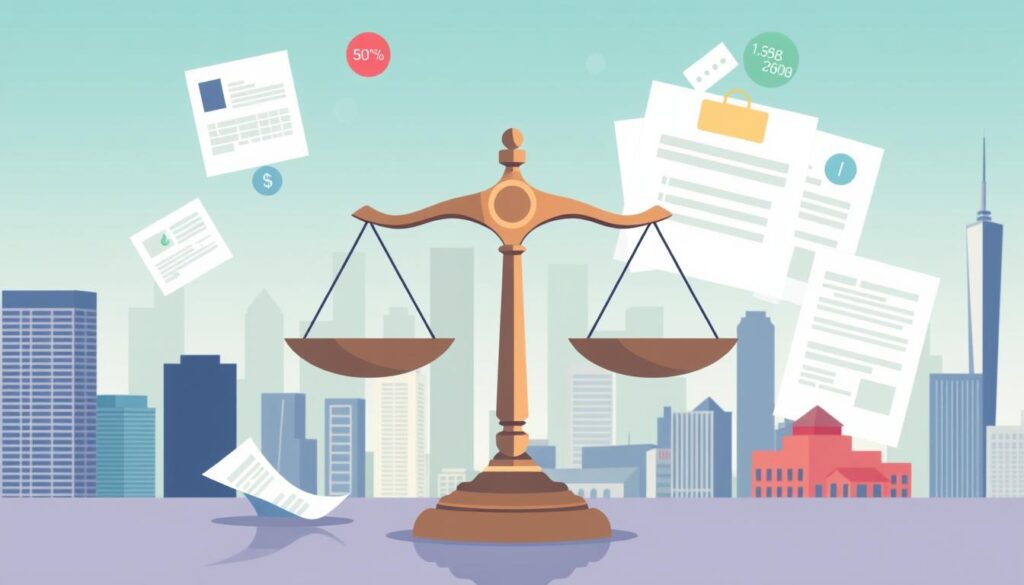Credit repair has become a hot topic in today’s financial landscape. Many people struggle with low credit scores, limiting their loan and mortgage options. Credit repair companies promise to boost credit profiles, but are they trustworthy?
This review dives into the world of credit repair services. We’ll examine their legality, pros, cons, and alternatives. Our goal is to help you make a smart choice about credit repair.
Key Takeaways
- Credit repair companies claim to help improve credit scores by disputing inaccurate or outdated information on credit reports.
- The legality of credit repair services is a complex issue, with regulations varying by state and the potential for fraudulent practices.
- Legitimate credit repair companies can provide benefits such as better credit scores, removal of errors, and improved financial opportunities.
- However, there are also risks involved, including potential scams, hidden fees, and the possibility of limited long-term impact.
- Exploring alternatives like DIY credit repair, credit counseling, and credit monitoring services may be viable options for some consumers.
Understanding Credit Repair Companies
Credit repair companies help people improve their credit scores and fix credit report errors. They offer services to help manage credit issues. These businesses aim to guide consumers through the complex world of credit.
What Are Credit Repair Companies?
Credit repair companies help remove negative items from credit reports. They tackle issues like late payments, collections, and identity theft problems. Their main goal is to boost clients’ credit scores by addressing these issues.
How Do Credit Repair Companies Work?
Credit repair companies follow a step-by-step process to help clients. They review credit reports and spot inaccuracies or questionable items. Then, they dispute these items with credit bureaus.
The process involves sending letters and documents to challenge negative information. If credit bureaus can’t verify the information, they must remove it from the report. This is required by law.
These companies also offer advice on building good credit and managing debt. They teach healthy financial habits to help improve credit scores long-term.
| Service | Description |
|---|---|
| Credit Report Disputes | Credit repair companies help clients dispute and remove inaccurate or questionable items from their credit reports. |
| Credit Score Improvement | By addressing negative items, credit repair services aim to help clients increase their credit scores over time. |
| Financial Education | Many credit repair companies provide guidance on building positive credit history and developing healthy financial habits. |
Credit repair companies can help those with poor credit. It’s crucial to research and pick a trustworthy provider. This ensures the best possible outcome for your credit repair journey.
The Legality of Credit Repair Services
Credit repair laws are crucial to understand. The Fair Credit Reporting Act (FCRA) governs credit repair services. This law sets consumer rights and credit bureau responsibilities.
The FCRA requires credit repair companies to follow specific rules. They can’t make false claims about improving credit scores. They must provide written contracts detailing services, timelines, and costs.
Consumers can dispute inaccurate credit report information themselves. The FCRA grants this right without needing a credit repair company. Individuals can take steps to improve their credit independently.
| Key Provisions of the Fair Credit Reporting Act (FCRA) | Description |
|---|---|
| Consumer Protections | The FCRA establishes consumers’ rights regarding the accuracy and privacy of their credit reports. |
| Credit Repair Regulations | The FCRA sets guidelines for the operation of credit repair companies, including prohibitions on false or misleading claims. |
| Dispute Resolution | The FCRA grants consumers the right to dispute inaccurate or incomplete information on their credit reports. |
Knowing the legality of credit repair helps consumers make smart choices. It ensures they work with trustworthy service providers. This knowledge empowers better credit management strategies.
“The Fair Credit Reporting Act is a critical piece of legislation that protects consumers and regulates the credit repair industry. It’s essential for anyone considering credit repair services to familiarize themselves with their rights and the applicable laws.”
Benefits of Using Credit Repair Companies
Credit repair companies offer valuable help for improving your financial standing. They focus on two main areas: boosting credit scores and fixing credit report errors.
Improved Credit Score
Credit repair firms can help raise your credit score. They spot and tackle negative items on your credit report. These may include late payments, collection accounts, or mistakes.
By challenging these issues, they can help improve your credit score. This process takes time, but the results can be significant.
Removal of Inaccurate Information
Credit reports sometimes contain wrong or misleading data. This can hurt your creditworthiness. Credit repair companies work to find and dispute these errors.
They team up with credit bureaus to remove false info. This leads to a more accurate and positive credit profile.
| Benefit | Description |
|---|---|
| Improved Credit Score | Credit repair companies can help identify and address negative items on credit reports, leading to a significant increase in credit scores over time. |
| Removal of Inaccurate Information | Credit repair companies can work with credit bureaus to identify and remove any inaccurate or misleading information from credit reports, resulting in a more accurate and favorable credit profile. |
“Working with a reputable credit repair company can be a game-changer for individuals looking to improve their financial standing and access better credit opportunities.”
Risks and Drawbacks of Credit Repair Companies
Credit repair companies can help improve your credit score. However, they come with potential risks and drawbacks. One major concern is the risk of falling victim to scams.
Potential Scams and Fraudulent Practices
Some dishonest credit repair companies use deceptive tactics to exploit consumers. These fraudulent practices can be harmful and costly.
- Charging excessive fees for services that provide little to no tangible benefits
- Advising clients to create a new identity or credit profile by obtaining an Employer Identification Number (EIN) to bypass their credit history
- Encouraging clients to dispute accurate negative information on their credit reports, which can lead to legal issues
- Failing to deliver on promises of improving credit scores or removing legitimate negative items from credit reports
These fraudulent credit repair practices can worsen your credit situation. They may also lead to legal and financial troubles. Research any credit repair company thoroughly before using their services.
This caution helps avoid falling victim to credit repair scams. Protect yourself by staying informed and vigilant.
| Legitimate Credit Repair | Fraudulent Credit Repair Practices |
|---|---|
| Helps clients dispute inaccurate or unverifiable negative items on their credit reports | Charges excessive fees for minimal or no tangible benefits |
| Advises clients on building credit responsibly | Encourages clients to create a new identity or credit profile to bypass credit history |
| Provides guidance on improving credit management | Disputes accurate negative information on credit reports |
Understanding the risks of credit repair is crucial. Be aware of credit repair scams. Avoid fraudulent credit repair practices that can harm your financial future.

Choosing a Legitimate Credit Repair Company
Selecting a reputable credit repair company is vital for improving your credit score. Not all services are equal, so careful research is necessary. Let’s explore key factors to consider when choosing a legitimate credit repair company.
Research and Check Reviews
Thoroughly investigate potential credit repair companies. Read reviews from past and current customers to gauge their service quality and effectiveness. Pay attention to both positive and negative feedback for valuable insights into their practices.
Look for Accreditations and Licenses
Legitimate companies should have proper accreditations and licenses for your state. Seek out members of industry associations like the National Association of Credit Services Organizations (NACSO). Look for registration with the Consumer Financial Protection Bureau (CFPB).
These credentials indicate a company’s commitment to ethical and legal practices. They show a dedication to providing quality services to their clients.
Careful evaluation of credit repair companies increases your chances of finding a trustworthy provider. A legitimate company can effectively help improve your credit score and overall financial health.
| Criteria | Legitimate Credit Repair Company | Illegitimate Credit Repair Company |
|---|---|---|
| Accreditations | Holds industry-recognized accreditations | Lacks accreditations or has questionable certifications |
| Licenses | Properly licensed to operate in your state | May not have the necessary licenses or may operate in multiple states without proper licensing |
| Customer Reviews | Mostly positive reviews from satisfied customers | Numerous negative reviews or complaints |
| Transparency | Provides clear and upfront information about their services and fees | Lacks transparency or may use deceptive marketing tactics |
Are Credit Repair Companies Legit?
Credit repair companies have sparked debate about their legitimacy. Some can help fix credit report errors. However, the industry has seen fraudulent practices and scams. Understanding these services is crucial for improving your financial standing.
Legitimate credit repair companies follow laws and regulations. In the US, the Fair Credit Reporting Act (FCRA) guides consumers and credit reporting agencies. Reputable companies operate within FCRA rules, ensuring legal and transparent practices.
| Factors to Consider | Legitimate Credit Repair Companies | Illegitimate Credit Repair Companies |
|---|---|---|
| Adherence to FCRA | Operate within the guidelines of the FCRA | Disregard or violate FCRA regulations |
| Transparency and Disclosure | Provide clear information about their services and fees | Lack transparency and may hide or misrepresent fees |
| Accreditations and Licenses | Hold relevant accreditations and licenses | Lack proper accreditations and licenses |
| Ethical Practices | Engage in ethical and lawful practices | Employ unethical or illegal tactics |
Evaluating these factors helps determine if a credit repair company is trustworthy. Remember, legitimate services can help but aren’t a quick fix. Consider DIY credit repair or credit counseling as alternatives.

Legitimate credit repair companies follow laws, practice transparency, and maintain ethical conduct. Research thoroughly and be cautious when choosing a service. This approach will help you make informed decisions aligned with your financial goals.
Alternatives to Credit Repair Companies
Credit repair companies can help improve your credit profile. However, there are other options to consider. These alternatives offer personalized and cost-effective approaches to credit management.
You can take control of your financial future. These options empower you to manage your credit effectively.
Do-It-Yourself Credit Repair
A viable alternative is do-it-yourself credit repair. This approach involves actively managing your credit report. You can identify and address errors in your credit report.
You can also implement strategies to boost your credit score. This method allows you to take charge of your financial health.
- Review your credit report regularly and dispute any errors or inaccuracies with the credit bureaus.
- Develop a plan to pay down debts and reduce your credit utilization ratio.
- Establish a history of on-time payments by setting up automatic bill payments or payment reminders.
- Monitor your credit score and continue to optimize your credit-building habits over time.
Taking a hands-on approach has many benefits. You can save money and gain a deeper understanding of your credit.
You’ll also have more control over the process. This method can lead to long-term financial success.
Alternatives to credit repair companies may require more time and effort. However, they can effectively improve your credit without third-party services.
Explore these options to find the best approach. Choose a method that suits your individual needs and financial goals.
Credit Counseling and Debt Management Plans
Credit repair companies aren’t the only way to boost your credit score. Credit counseling and debt management plans offer different paths to better credit.
Credit counseling services give personal guidance to those struggling with debt. These nonprofits work with creditors to lower interest rates and fees. They also help create manageable payment plans.
By combining multiple debts into one monthly payment, credit counseling can improve your credit over time. This approach helps people get back on track financially.
| Benefit | Credit Counseling | Debt Management Plan |
|---|---|---|
| Interest Rate Reduction | ✓ | ✓ |
| Debt Consolidation | ✓ | ✓ |
| Improved Credit Score | ✓ | ✓ |
| Personalized Guidance | ✓ | X |
Debt management plans are a specific type of credit counseling program. They focus on consolidating and repaying outstanding debts. These plans negotiate with creditors to lower interest rates and monthly payments.
This approach allows people to pay off debts more efficiently. It can also improve your credit score in the long run.
“Credit counseling and debt management plans offer a structured approach to debt repayment, helping individuals regain control of their finances and improve their credit profile over time.”
Credit counseling and debt management plans offer a thorough, lasting solution. They tackle the root causes of debt and work closely with creditors.
This approach can lead to long-term financial stability. It can also help you build a healthier credit history.

Credit Monitoring and Identity Protection Services
Credit monitoring and identity protection services are vital tools for improving your credit health. They offer a thorough approach to safeguarding your finances. These services watch your credit reports and shield you from identity theft.
Credit monitoring services update you on your credit score regularly. They alert you to any suspicious activity that might show fraud. This early detection can stop further damage to your credit and finances.
Many providers offer credit score tracking and report analysis. They also give personalized tips to boost your credit profile.
Identity protection services go beyond credit monitoring. They actively guard your personal information across various databases. These services alert you to data breaches and help if your identity is stolen.
They can help you regain control of your identity quickly. This minimizes the impact of any unauthorized use of your information.
Credit repair companies fix inaccuracies on your credit report. Credit monitoring and identity protection complement this work. Together, they provide a full approach to improving your credit score and financial security.
| Feature | Credit Monitoring | Identity Protection |
|---|---|---|
| Credit Report Monitoring | ✓ | ✓ |
| Credit Score Tracking | ✓ | ✓ |
| Fraud Alerts | ✓ | ✓ |
| Identity Theft Restoration | – | ✓ |
| Personal Information Monitoring | – | ✓ |
Using both services helps protect your financial well-being and improve your credit score. They offer valuable protection and peace of mind in our digital world.
The Fair Credit Reporting Act (FCRA)
The Fair Credit Reporting Act (FCRA) protects consumers’ credit information. It governs how credit data is collected, used, and kept accurate. This law gives you important rights for your credit reports and scores.
Your Rights Under the FCRA
The FCRA gives you several rights as a consumer. These rights ensure fair treatment and responsible handling of your credit information.
- The right to access your credit report for free from each of the three major credit bureaus (Experian, Equifax, and TransUnion) once a year.
- The right to dispute any inaccurate or incomplete information on your credit report and have it investigated and corrected.
- The right to be notified when information in your credit report has been used against you, such as when you are denied credit or employment.
- The right to have outdated negative information, like late payments or bankruptcies, removed from your credit report after a certain period of time.
- The right to have your credit report kept confidential and only accessed for legitimate business purposes.
Knowing your FCRA rights is key to protecting your credit. It helps ensure your credit report is accurate. This accuracy is vital for getting loans and other financial opportunities.
By using these rights, you can maintain a fair credit profile. This can open doors to better financial options in the future.

| Key FCRA Rights | Description |
|---|---|
| Free Annual Credit Report | Consumers are entitled to a free credit report from each of the three major credit bureaus once per year. |
| Dispute Inaccurate Information | Consumers can dispute any inaccurate or incomplete information on their credit report and have it investigated and corrected. |
| Notice of Adverse Action | Consumers must be notified when information in their credit report has been used against them, such as when they are denied credit or employment. |
| Removal of Outdated Information | Negative information, like late payments or bankruptcies, must be removed from a consumer’s credit report after a certain period of time. |
| Confidentiality of Credit Report | Consumer credit reports must be kept confidential and can only be accessed for legitimate business purposes. |
The fair credit reporting act protects consumer rights and ensures accurate credit report disputes. Understanding your FCRA rights helps you control your credit profile. This knowledge can lead to a stronger financial future.
Tips for Improving Your Credit Score
A good credit score opens doors to better loans and job opportunities. You can boost your score over time with proven strategies. Here are some effective tips to improve your credit score:
- Pay your bills on time – Payment history greatly affects your credit score. Pay all bills, including credit cards, in full and on time monthly.
- Keep credit card balances low – Try to keep balances below 30% of your total credit. This shows responsible usage and improves your credit utilization ratio.
- Diversify your credit mix – Having various credit accounts can boost your score. This includes credit cards, auto loans, and mortgages.
- Monitor your credit report – Check your credit report often for errors. Dispute any issues with credit bureaus quickly to help improve your score.
- Limit hard credit inquiries – New credit applications can lower your score slightly. Only apply for credit when necessary to limit hard inquiries.
These tips can help you take control of your finances. You’ll unlock better opportunities for personal and professional growth.
| Tip | Impact on Credit Score |
|---|---|
| Pay bills on time | High |
| Keep balances low | High |
| Diversify credit mix | Moderate |
| Monitor credit report | Moderate |
| Limit hard inquiries | Low |
Using these strategies can help you build a strong credit history. You’ll gain more financial flexibility and opportunities over time.
“Improving your credit score is a journey, not a destination. With patience and diligence, you can achieve the financial freedom you deserve.”
Avoiding Credit Repair Scams
Credit repair companies can help improve your credit score. However, scams are common in this industry. It’s vital to recognize warning signs of untrustworthy companies.
Red Flags to Watch Out For
Be wary of companies promising to remove accurate negative information. Legitimate services can only dispute and remove inaccurate or unverifiable details. They can’t erase valid negative items from your credit history.
Another warning sign is upfront payment demands. Reputable companies only charge after completing promised services. If a company asks for money before doing work, it’s likely a scam.

